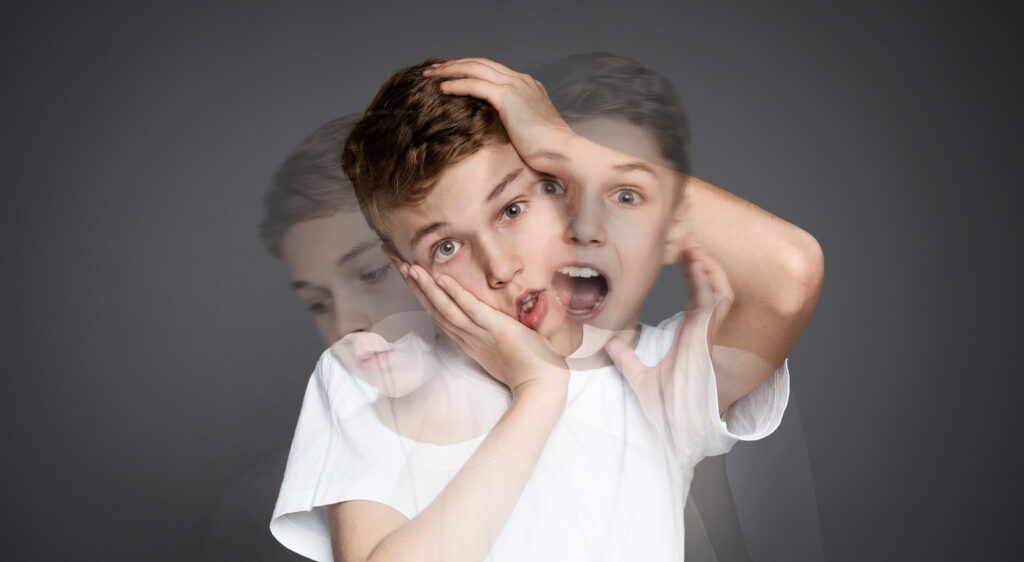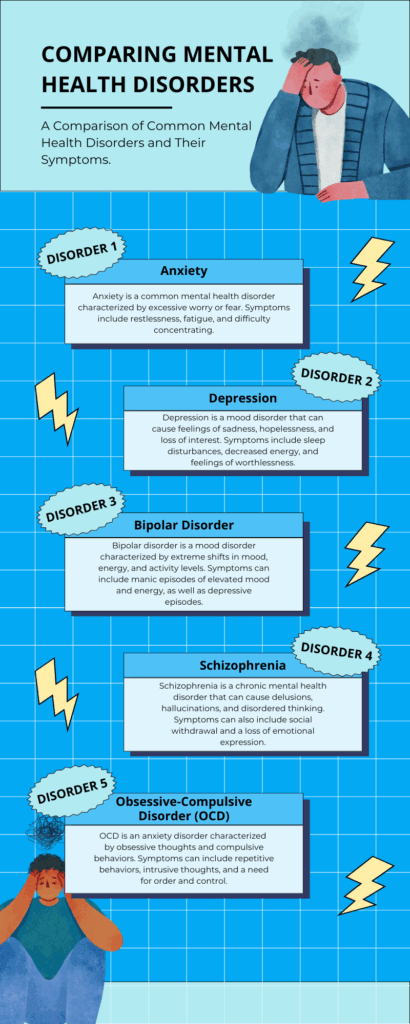What Are Dissociative Disorders?
Dissociative disorders involve disruptions in memory, identity, consciousness, and perception. These disruptions can make people feel disconnected from themselves, their thoughts, feelings, or surroundings—a phenomenon called dissociation.
Dissociation often develops as a coping mechanism in response to overwhelming stress or trauma, particularly in childhood.
Types of Dissociative Disorders
- Dissociative Identity Disorder (DID), previously known as multiple personality disorder, DID involves two or more distinct identities or personality states within one person. Each identity may have its name, age, history, and traits.These identities often emerge to compartmentalize traumatic memories and experiences. DID is frequently linked to severe childhood trauma, such as abuse or neglect.
- Dissociative Amnesia causes an inability to recall important personal information, usually related to trauma or stress. Unlike amnesia from brain injury, dissociative amnesia is psychological.Memory loss can be localized (a specific event), selective (certain details), or generalized (covering a person’s entire life history).
- Depersonalization-Derealization Disorder causes people to feel detached from themselves (depersonalization) or the world around them (derealization). They might feel like they’re watching themselves outside their body or that their surroundings are unreal or dreamlike.These experiences are often distressing and can disrupt daily life.
- Other Specified Dissociative Disorders (OSDD) covers dissociative symptoms that don’t fully match the criteria for the different disorders but still cause significant distress and impairment.Individuals may experience identity disturbances, memory gaps, or other dissociative symptoms.
Causes and Risk Factors
Research shows a strong link between dissociative disorders and traumatic events, especially in childhood. Physical, emotional, or sexual abuse, neglect, and domestic violence are common risk factors.
Dissociation acts as a protective mechanism, helping people distance themselves from overwhelming pain or fear.
Other risk factors include chronic stress, anxiety disorders, family history of mental health issues, and exposure to war or natural disasters.
Recognizing the Signs: When to Seek Help
If you or someone you love experiences frequent memory loss, identity confusion, unexplained behavior changes, or distress affecting daily life, it’s important to seek professional help.
Early intervention can prevent complications and improve long-term outcomes.
Signs and Symptoms of Dissociative Disorders
Recognizing dissociative disorders can be tough because symptoms often overlap with other mental health conditions like anxiety, schizophrenia, or OCD.
Common signs include:
- Frequent memory loss or gaps
- Identity confusion or multiple identities
- Feeling disconnected from oneself or surroundings
- Unexplained behavior or mood changes
- Difficulty functioning at work or school
- Emotional numbness
- Distress that affects daily life.
Dissociative disorders often co-occur with depression, anxiety, substance abuse, and eating disorders. This dual diagnosis requires specialized treatment.
The Dangers of Untreated Dissociative Disorders
Without treatment, dissociative disorders can cause serious problems, including emotional distress, inability to function day-to-day, suicidal thoughts, substance abuse, vulnerability to victimization, distorted personal boundaries, and strained relationships.
Comprehensive, evidence-based treatment is key to managing symptoms and improving quality of life.
The Impact of Dissociative Disorders
These disorders can affect every part of a person’s life. Memory loss, identity confusion, and emotional distress can strain relationships, work, and daily activities.
People may struggle to keep jobs, finish school, or care for their families. They also face higher risks of self-harm, suicidal thoughts, and substance use disorder.
Family members often feel confused or helpless trying to support someone with a dissociative disorder. Education, support groups, and family therapy can help families cope and understand.

The Importance of Accurate Diagnosis
Dissociative disorders are often misdiagnosed because their symptoms resemble those of other mental health conditions. For example, memory loss and disconnection might be mistaken for schizophrenia or bipolar disorder.
Anxiety and obsessive thoughts can lead to diagnoses of anxiety disorders or OCD.
At Thoroughbred Wellness and Recovery, our mental health professionals conduct thorough assessments to ensure accurate diagnoses. We use evidence-based tools and clinical interviews to evaluate symptoms, history, and co-occurring conditions.
This careful approach lets us create personalized treatment plans tailored to each guest.
Evidence-Based Treatment Options at Thoroughbred Wellness and Recovery
Treating dissociative disorders effectively requires a holistic, individualized approach. Our Atlanta-based center offers a variety of evidence-based therapies and interventions to promote healing and long-term recovery.
Psychotherapy is the foundation of treatment. Our therapists use various methods, including:
- Cognitive Behavioral Therapy (CBT) helps guests challenge distorted thoughts and develop healthier coping skills. It’s effective for anxiety, depression, and trauma symptoms often linked to dissociative disorders.
- Dialectical Behavior Therapy (DBT) is helpful for those with borderline personality disorder, emotional dysregulation, or self-harm behaviors. DBT teaches mindfulness, distress tolerance, emotional regulation, and interpersonal skills.
- Eye Movement Desensitization and Reprocessing (EMDR) is an evidence-based trauma therapy that helps guests process traumatic memories and reduce their emotional impact.
- Trauma Therapy approaches help guests integrate traumatic experiences, reduce dissociation, and build resilience.
- Individual Therapy provides a safe space to explore thoughts and feelings, set goals, and develop coping strategies.
- Group Therapy offers support and connection, where guests learn from others facing similar challenges.
- Family Therapy involves loved ones to improve communication and strengthen relationships.
Holistic and Experiential Therapies
We treat the whole person. Our holistic options include:
- Yoga and Mindfulness: Promote relaxation and emotional balance.
- Art and Music Therapy: Provide creative outlets for expression and healing.
- Equine Therapy: Working with horses fosters trust and confidence.
- Breathwork and Meditation: Help manage stress, anxiety, and dissociation.
Dual Diagnosis and Co-Occurring Disorders
Dual diagnosis refers to the presence of both a mental health disorder and a substance use disorder in the same individual. This combination is common and can make diagnosis and treatment more complex, as each condition can influence the course and severity of the other.
Effective treatment requires an integrated approach that addresses both issues simultaneously, improving the chances of long-term recovery and overall well-being.

Common Dual Diagnosis Pairs:
- Depression and alcohol use disorder
- Anxiety disorders and benzodiazepine or alcohol use disorder
- Bipolar disorder and substance use disorder (such as cocaine or alcohol)
- Post-traumatic stress disorder (PTSD) and opioid or alcohol use disorder
- Schizophrenia and cannabis or stimulant use disorder
- Borderline personality disorder and substance use disorder
- Attention-deficit/hyperactivity disorder (ADHD) and stimulant or alcohol use disorder
- Obsessive-compulsive disorder (OCD) and alcohol use disorder
These pairs highlight the importance of comprehensive, integrated treatment programs that address both mental health and substance use challenges together.
Levels of Care: Personalized Treatment Programs
Recovery looks different for everyone. We offer multiple levels of care to fit diverse needs:
- Residential Treatment (Inpatient) provides 24/7 care in a safe, structured setting. It is ideal for severe symptoms or those who have not succeeded with outpatient care.
- Partial Hospitalization Program (PHP) offers daily therapy and support while guests return home in the evenings. It suits those needing more than outpatient care but not full-time supervision.
- Intensive Outpatient Program (IOP) is for guests with supportive home care ready for more independence. It includes several therapy sessions per week.
- Outpatient Treatment is ongoing support for those transitioning from higher levels of care or with milder symptoms.
The Role of Family and Support Systems
Recovery isn’t a solo journey. Family and loved ones play a vital role. We encourage family involvement through education, therapy, and support groups to help improve communication and build stronger relationships.
Building Coping Skills and Resilience
A core part of our program helps guests develop coping skills and resilience. Through therapy, education, and experiential activities, guests learn to manage stress, regulate emotions, and handle triggers in healthier ways.
Our therapists teach practical strategies like distress tolerance, mindfulness, and self-care to empower guests in their recovery.
Personalized Care and Treatment Planning
We know no two people are the same. Thoroughbred Wellness and Recovery treatment plans are tailored to each guest’s needs, preferences, and goals.
We work closely with guests, families, and other providers to create actionable plans. Regular check-ins make sure treatment stays effective and responsive.
The Path to Wellness: Hope and Healing in Atlanta, Georgia
Living with a dissociative disorder is tough, but recovery is possible. People can reclaim their lives and find lasting wellness with support, evidence-based therapies, and a caring team.
Thoroughbred Wellness and Recovery is committed to helping guests and families in Atlanta and beyond find hope, healing, and a brighter future.
If you or a loved one is struggling with dissociative disorders, substance use disorder, or other mental health issues, don’t wait to get help. Contact Thoroughbred Wellness and Recovery today at 770-564-4856 to learn about our treatment options and levels of care.










